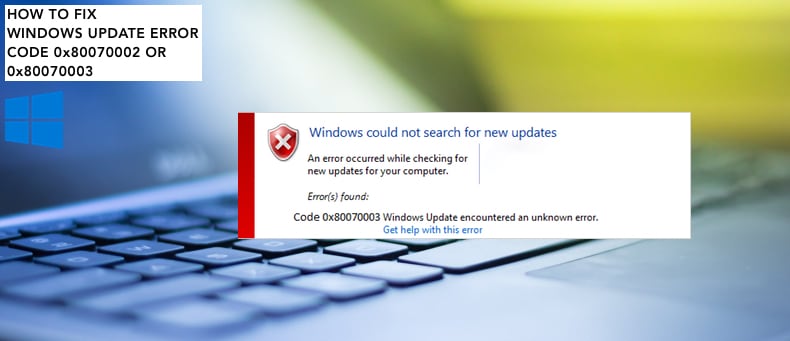Fix Windows Update Error 0x80070002 and 0x80070003
Get Free Scanner and check your computer for errors
Fix It NowTo fix found issues, you have to purchase the full version of Combo Cleaner. Free trial available. Combo Cleaner is owned and operated by Rcs Lt, the parent company of PCRisk.com read more.
How to Fix Windows Update Error 0x80070002 and 0x80070003
Windows Update is a free service for Windows. It is essential to keep Windows updated, primarily because of security updates that help stay protected online. However, the update process may fail due to errors such as 0x80070002 and 0x80070003. This article focuses on fixing these particular error codes.

You may have encountered a Windows Update error code 0x80070002 or 0x80070003. This error usually occurs when Windows updates cannot be installed, when the installation process is in progress, or when updates are installed, but the process cannot be completed. The reason behind this problem remains unknown. However, one cause might be missing Windows Update files, even though the updates appear to have been downloaded and extracted.
Fortunately, there are several ways to resolve the issue with one or both error codes. You might need to run the Windows Update troubleshooter, check system files for corruptions, temporarily disable installed third-party antivirus software, delete SoftwareDistribution files, check time and date settings, and perform a clean boot to check that installed third-party software is not interfering with the Windows Update service.
The guide below thoroughly describes the various methods with screenshots.
Video Showing How to Fix Windows Update Error Codes 0x80070002 and 0x80070003
Table of Contents:
- Introduction
- Run Windows Update Troubleshooter
- Download Servicing Stack Update
- Temporary Disable Installed Third-Party Antivirus
- Run DISM and System File Checker
- Check Time and Date Settings
- Restart Windows Update Service and Rename SoftwareDistribution Folder
- Start Windows in a Clean Boot State
- Video Showing How to Fix Windows Update Error Codes 0x80070002 and 0x80070003
Download Computer Malware Repair Tool
It is recommended to run a free scan with Combo Cleaner - a tool to detect viruses and malware on your device. You will need to purchase the full version to remove infections. Free trial available. Combo Cleaner is owned and operated by Rcs Lt, the parent company of PCRisk.com read more.
Run Windows Update Troubleshooter
First, try one of the Windows troubleshooters, which could solve the problem without needing more complex solutions. This guide shows how to run the Windows Update troubleshooter, which resolves issues that prevent you from updating Windows. You can find this troubleshooter using Windows settings Search. Go to Settings, type "troubleshoot" in the Windows Settings search bar, and click the "Troubleshoot" result.

Now find the Windows Update troubleshooter under "Troubleshoot" and select it. Click the "Run the troubleshooter" button. Windows will start resolving problems that prevent you from properly updating the Windows operating system.
Check if this troubleshooter can resolve the issues with Windows Update error code 0x80070002 or 0x80070003.

Download Servicing Stack Update
You can download the latest Servicing Stack Update, which must reliably install the latest features and quality updates. First, you need to determine the system type by going to Settings and clicking the "System" option.

Scroll down through the left pane and find "About", which should be the last option on the list. Select it and check the system type next to the "System type" section. In our example, it is a 64-bit operating system, x64-based processor.

Go to Microsoft Update Catalog and download the latest version of the Servicing Stack Update that matches your version of Windows.
Install it, restart your computer, and try to update Windows. Check if the Windows Update error code 0x80070002 or 0x80070003 is now fixed.

Temporary Disable Installed Third-Party Antivirus
Installed antivirus software may be interfering with Windows Update and causing Windows Update error code 0x80070002 or 0x80070003. To ensure that the installed third-party antivirus software is not the source of the problem, we recommend that you try to temporarily disable this software (and its associated firewall). Then try to update Windows again and check if the problem persists.
If disabling (or uninstalling) your antivirus software solves the problem, we recommend that you switch to other antivirus software or reinstall the currently installed version. If you are not sure how to disable your antivirus software, read this guide in which you will find instructions on how to disable some of the most popular antivirus programs.
Run DISM and System File Checker
Deployment Image Servicing and Management (DISM) can repair and prepare Windows images, including the Windows Recovery Environment, Windows Setup, and Windows PE.
To run a DISM scan, open Command Prompt as administrator by typing "command prompt" in Search and right-click the "Command Prompt" result. Select the "Run as administrator" option from the contextual menu.

In Command Prompt, type the "DISM /Online /Cleanup-Image /RestoreHealth" command and press Enter. Once the DISM scan is complete, run the System File Checker. Run both DISM and SFC scans (not just one).

System File Checker is a Windows utility that allows users to scan for corruptions in Windows system files and restore corrupted files. This guide describes how to run the System File Checker tool (SFC.exe) to scan your system files and repair missing or corrupted ones. The "sfc scannow" option is one of several specific switches available with the SFC command.
To execute this command, type "sfc /scannow" in Command Prompt and press Enter. System File Checker will start and take some time to complete the scan. Wait for the scanning process to complete and then check if Windows Update error 0x80070002 or 0x80070003 persists when updating the Windows operating system.

Check Time and Date Settings
It is possible that Windows cannot be updated due to incorrect time and date settings on your Windows computer. To check these, go to Windows Settings and click on "Time & Language".

Select "Date & time" on the left pane and then make sure that the "Set time automatically" and "Set time zone automatically" options are both enabled. Try to disable and re-enable them by toggling the switch. Then click on "Add clock for different time zones".

Select the "Internet Time" tab and click the "Change settings..." button.

Make sure that the "Synchronize with an Internet time server" checkbox is ticked, and the server is "time.windows.com" or "time.nist.gov". Click the "Update now" button and try to update Windows.

Restart Windows Update Service and Rename SoftwareDistribution Folder
The 'SoftwareDistribution' folder is a temporary folder in which Windows stores the update files until they are completely downloaded. Windows then starts the update process. In this case, renaming the SoftwareDistribution folder might resolve the Windows Update error code 0x80070002 or 0x80070003 issue.
To rename the folder, you will need to stop the Windows Update service using a Command Prompt command, rename the folder, and then restart the service.
Open Command Prompt as administrator and type the "net stop wuauserv" command. Press Enter to execute it.

Type the "ren C:\Windows\SoftwareDistribution SoftwareDistribution.old" command and press Enter.

Type the "net start wuauserv" command and press Enter. Restart the computer and check if you still receive the Windows Update error code 0x80070002 or 0x80070003.

Alternatively, you can go to C:\Windows\SoftwareDistribution and delete all files and folders in the SoftwareDistribution folder. Stop the wuauserv service, delete SoftwareDistribution folder contents, and then restart the service. Restart the computer and try to update Windows.
Start Windows in a Clean Boot State
When you start Windows using a normal startup operation, several applications and services start automatically and then run in the background. These programs include basic system processes, antivirus software, system utility applications, and other previously installed software. These applications and services can cause software conflicts, resulting in the Windows Update error code 0x80070002 or 0x80070003.
A clean boot is performed to start Windows using a minimal set of drivers and startup programs. This helps eliminate software conflicts when you install a program or an update or run a program in Windows.
To perform a clean boot, type "system configuration" in Search and click on the "System Configuration" result.

In the System Configuration window, click on the "Services" tab and mark the "Hide all Microsoft services" checkbox. Then, click on "Disable all".

Click the "Startup" tab and click "Open Task Manager".

Under the Task Manager Startup tab, select all enabled applications one by one and click "Disable" for each. Once all programs are disabled, close Task Manager and click "OK" in the System Configuration Startup tab. Restart the computer and check if you can update Windows in a clean boot state.

We hope this guide was helpful and you were able to fix Windows Update error code 0x80070002 or 0x80070003.
If you know of other solutions to this problem not mentioned in our guide, please share them with us by commenting below.
Share:

Rimvydas Iliavicius
Researcher, author
Rimvydas is a researcher with over four years of experience in the cybersecurity industry. He attended Kaunas University of Technology and graduated with a Master's degree in Translation and Localization of Technical texts. His interests in computers and technology led him to become a versatile author in the IT industry. At PCrisk, he's responsible for writing in-depth how-to articles for Microsoft Windows.

▼ Show Discussion